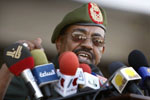
On September 5, Sudanese President Omar al-Bashir called on the African Union to legislate protection of African space against “spy satellites.” Bashir, who has been indicted by the International Criminal Court, spoke at a telecommunications conference in Khartoum, pushing for a unified continent-wide space agency.
"I'm calling for the biggest project, an African space agency," Bashir told a gathering of communications ministers in Khartoum. "Africa must have its space agency." It "will liberate Africa from the technological domination," he said.
Robert Beckhusen, writing for Wired Magazine’s Danger Room blog on September 6, speculates that Bashir’s call for an African space agency stems from ulterior motives to avoid responsibility for his regime’s crimes against humanity that have been captured by the work of the Satellite Sentinel Project, or SSP.
SSP, a partnership between Enough Project and DigitalGlobe, shines a spotlight on the atrocities committed in the Sudans by providing satellite imagery and analysis of evidence of war crimes and crimes against humanity. Bashir’s call for legislation against satellites indicates that he has become increasingly pressured by the evidence mounting against him and his regime and wants to do all he can to strike down any threats to the ruling National Congress Party.
President Bashir’s fear of satellites is not unwarranted, as just last month SSP released a situation report documenting Sudan Armed Forces’ aircrafts within striking range of both the Nuba Mountains and South Sudanese refugees across the border. By gathering this information, SSP aims to sound the alarm and protect civilians from violence at the hands of the Sudanese government. In the past, images captured by SSP have been assembled as evidence in the International Criminal Court against President Bashir’s defense minister, Abdelrahim Mohamed Hussein. The irony in Bashir’s request for protection against SSP’s satellites is that the satellites are in place to help protect the Sudanese people from state-perpetrated violence.
What will come of Bashir’s quest to legislate against satellites? The answer is likely nothing. “Satellites can’t violate Khartoum’s airspace if they’re orbiting above the planet,” writes Beckhusen. He further asserts, “an all-Africa space program is an intriguing idea, though problematic if Bashir is packaging it to the African Union while dodging responsibility for his crimes.” And as for the goal of a unified African space agency, it is in the very conceptual stages. This follows a controversial feasibility study for the creation of such an agency approved by the African Union in 2010 which sparked criticism because of the potential cost of such a large-scale project. According to The Guardian, a working document issued for the Khartoum conference said the proposed agency would enable "co-operation among African states in space research and technology and their space applications."

